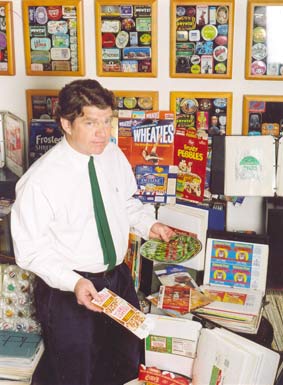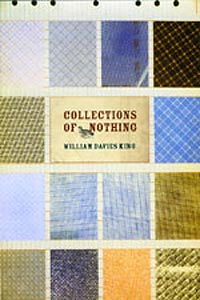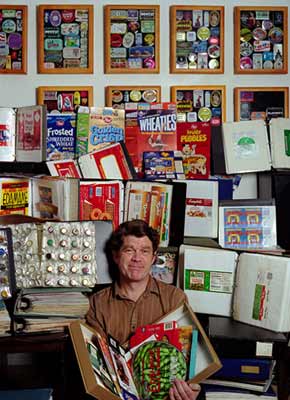UCSB Professor William Davies King’s Collections of Nothing
Wheaties and Nothingness

Ever since he snapped up an irregularly shaped scrap of metal while at boarding school, UCSB theater professor William Davies King has been steadily acquiring things most would consider garbage-seatless chairs, envelope liners, cereal boxes-and this collection of collections has grown to stunning proportions. How does he introduce this behemoth aggregation, for decades so integral to his life, to new friends and acquaintances?
“Cautiously,” he explained over the phone from his Santa Barbara home. “I begin by showing my ‘stamp’ collection: early on, I had stamp collecting imposed upon me, and I found it really obnoxious and not to my taste, so I collected ‘place stamp here’ squares instead. But at some point, I have to reveal the most voluminous collection, the biggest in terms of sheer numbers and sheer strangeness: all these product labels I have. Over 1,800 cereal boxes, over 800 soup labels, 400 water labels, things like that. There are people who collect one category of these: Wheaties box collectors, for instance. There are very few Honey Nut Cheerios or Uncle Sam Cereal collectors, very few people who collect blueberry labels and mushroom cans and all the miscellany in between.”

King’s are collections of nothing, that is, things of no outward value. “It comes out of a 20th-century vocabulary of art, going back to Dadaism, which was an art that believed in nothing” King said. “My own education led me to the Dadaist artists and their strange, often outsider art that was alert to the idea that emptiness of meaning might be as expressive and ‘true’ as art that purports to be full of meaning. I searched for artwork that would express my own anxiety in the face of the modern world’s questionable values. I think anxiety takes the form of nothingness: it’s this strange void within you that never seems to get filled up.”
King had collected instinctively for years, but he recently took a step back from the practice, which changed and enriched his perspective. “My kids, in their very direct way, suddenly started asking why I do this,” he said. “I began to wonder myself, and with the question of why hanging in the air, it became a lot more interesting.” In an attempt to answer that question, King wrote Collections of Nothing, his memoir on collecting newly published by the University of Chicago Press, in which he examines his penchant for collecting through the prism of his life and through that of American society as a whole. “My standard line was that collecting helped me make sense of what it is to be a consumer, which was bogus because I wasn’t doing any research. But once I started thinking about it, it did help me make sense of consumerism. Advertisers want you to choose their brand and stick with it religiously. As a collector, I was completely resistant to that, because I bought something different each time. It led me to have, if not freedom from consumer pressure, at least a distance from it.”

The theme of imbuing the outwardly inconsequential with meaning runs through King’s academic work as well. “Some would say of my career, ‘Why is he always dealing with such marginal, unimportant subjects, never taking on the big topics?'” he said. “It’s been my scholarly instinct all along to take marginal subjects. My first book looked at an anecdote of theater history about Henry Irving, one of the great 19th-century English actors. Toward the end of his career, he did a little one-act play by Arthur Conan Doyle that he had success with, but George Bernard Shaw wrote a review of it that was the single most devastating, scathing, completely dismantling review I’d ever read. That led me to read the play, which led me to write a whole book about that minute piece of theater history from 1895.”
The four years spent on Collections of Nothing analyzing his own personal minutia gave King a valuable insight into his collections. “I learned that the impulse to collect is connected to the impulse to create,” he observed. “It seems more like preservation, which isn’t really creation, but in giving order to what you’ve saved, in making selections, and in your presentation of the material, there is a creative aspect. I hadn’t before seen it as something directly connected to the art-making impulse. I’d thought of collecting as a pastime, but in writing the book I developed a more creative view of it.”
4•1•1
William Davies King will discuss and sign Collections of Nothing at Chaucer’s Books on July 27 at 3 p.m., and will give a talk on collecting at the Osher Life Learning Institute at UCSB on July 22. Visit chaucers.booksense.com or www.extension.ucsb.edu/olli for more information.



